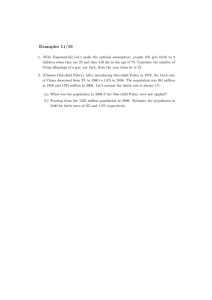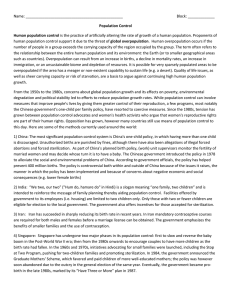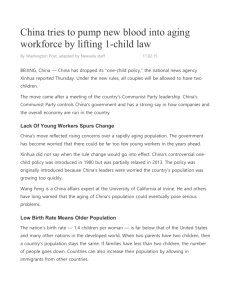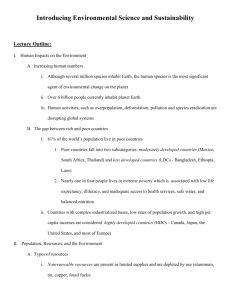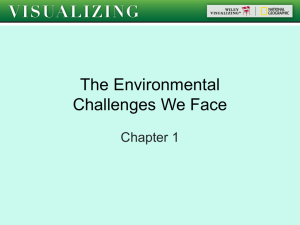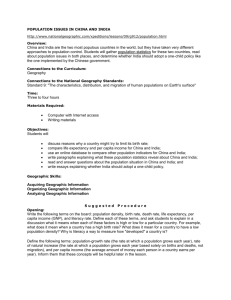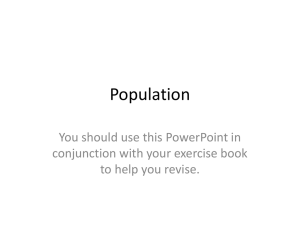Population debate - The Beacon School
advertisement
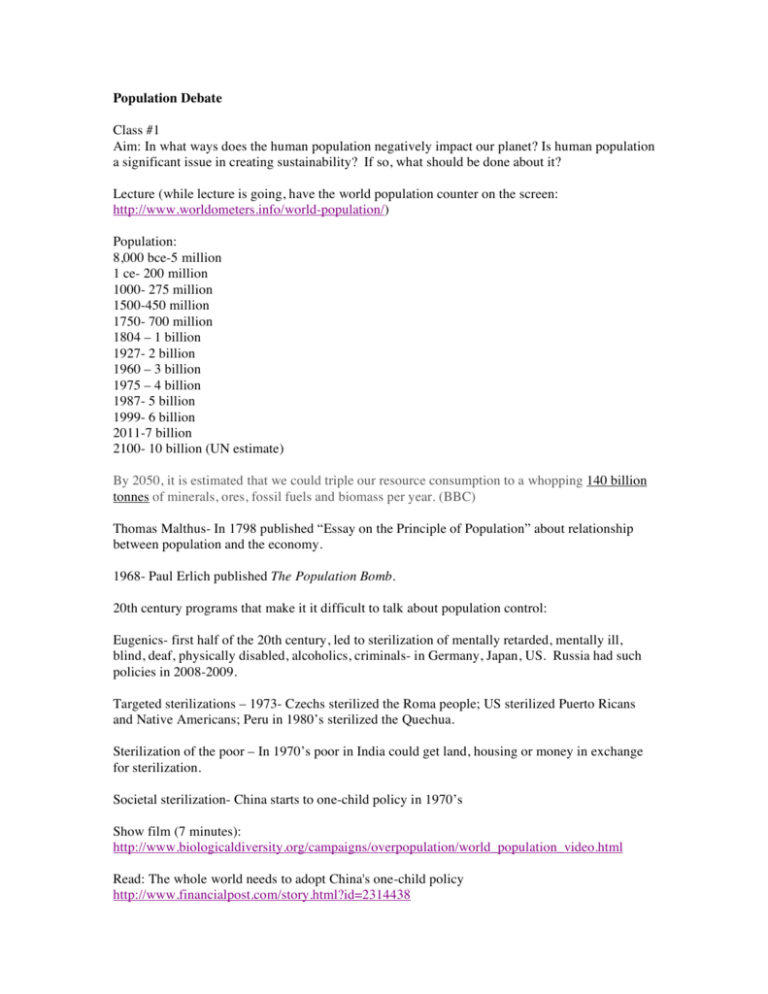
Population Debate Class #1 Aim: In what ways does the human population negatively impact our planet? Is human population a significant issue in creating sustainability? If so, what should be done about it? Lecture (while lecture is going, have the world population counter on the screen: http://www.worldometers.info/world-population/) Population: 8,000 bce-5 million 1 ce- 200 million 1000- 275 million 1500-450 million 1750- 700 million 1804 – 1 billion 1927- 2 billion 1960 – 3 billion 1975 – 4 billion 1987- 5 billion 1999- 6 billion 2011-7 billion 2100- 10 billion (UN estimate) By 2050, it is estimated that we could triple our resource consumption to a whopping 140 billion tonnes of minerals, ores, fossil fuels and biomass per year. (BBC) Thomas Malthus- In 1798 published “Essay on the Principle of Population” about relationship between population and the economy. 1968- Paul Erlich published The Population Bomb. 20th century programs that make it it difficult to talk about population control: Eugenics- first half of the 20th century, led to sterilization of mentally retarded, mentally ill, blind, deaf, physically disabled, alcoholics, criminals- in Germany, Japan, US. Russia had such policies in 2008-2009. Targeted sterilizations – 1973- Czechs sterilized the Roma people; US sterilized Puerto Ricans and Native Americans; Peru in 1980’s sterilized the Quechua. Sterilization of the poor – In 1970’s poor in India could get land, housing or money in exchange for sterilization. Societal sterilization- China starts to one-child policy in 1970’s Show film (7 minutes): http://www.biologicaldiversity.org/campaigns/overpopulation/world_population_video.html Read: The whole world needs to adopt China's one-child policy http://www.financialpost.com/story.html?id=2314438 Begin to frame the debate. Discuss Hardin’s “Lifeboat Ethics.” HW: Please read the three articles. 1.Take notes on the controversy around “family planning” or “population control” policies. Take note also of the concept of “carrying capacity” and how that impacts the discussion around population. Can we talk about overpopulation? By David Craig http://www.columbia.edu/cu/alumni/Magazine/Summer2009/feature4.html Global Population Reduction: Confronting the Inevitable http://www.worldwatch.org/node/563 Breaking a Long Silence on Population Control http://www.nytimes.com/2011/11/01/science/earth/bringing-up-the-issue-of-populationgrowth.html?pagewanted=all&_r=0 Class #2 and 3 Aim: In what ways does the human population negatively impact our planet? Is human population a significant issue in creating sustainability? If so, what should be done about it? Discuss homework readings: Main points: Can we talk about Overpop? By David Craig: Jeffrey Sachs has said that we should give free contraceptives to Africans so that they can escape from poverty; Connelly thinks that any program designed to lower pop will lead to problems. Discuss: United Nations International Conference on Population and Development in Cairo, 1994 The Cairo Program of Action Acknowledges the complex personal and social contexts within which decisions about childbearing are made. It separates the problem of unwanted fertility, which can be addressed by access to family planning services, from other causes of population growth, including the desire for large families. Calls for other social investments -- such as the education of girls and the reduction of infant mortality -- to help make small families the norm. Endorses a reproductive health approach to family planning. Recognizes the central role of gender relations, with a link between high fertility and the low status of women, and offers strategies to empower women through access to education, resources and opportunity. Addresses the harmful effects of northern consumption patterns, drawing the connection between consumption, population growth and environmental degradation. Strikes a historic compromise on abortion. While declaring that "in no case should abortion be promoted as a method of family planning," the document asks governments to address unsafe abortion as a major public health concern. It also asks governments to ensure that abortion services are safe when they are not against the law, to provide reliable and compassionate counseling for all women who have unwanted pregnancies and to provide humane care for all women who suffer the consequences of unsafe abortion. Stands on solid ethical ground. Coercion of all is rejected. The means it proposes to slow population growth are all desirable ends in themselves. It offers strategies to narrow the gaps between rich and poor, and between men and women. Class discussion on China’s one-child policy. Have students read the two articles below and answer question. QUESTION: Are strict state policies (like China’s one-child policy) on population necessary for limiting human population and achieving environmental sustainability? OVERVIEW: In an effort to become a world power, Mao Zedong promoted China’s population growth as a means of increasing the work force and thus economic rewards. As a result, China’s population grew at a rapid rate. China currently has the world’s largest population. In an effort to curb population growth, Deng Xiaoping instituted the One Child Policy in 1979. This policy encouraged the people of China to have only one child. Those who followed this policy received housing, medical, and work benefits those who ignored this policy were penalized. Has China's one-child policy worked? http://news.bbc.co.uk/2/hi/asia-pacific/7000931.stm China Says One-Child Policy Helps Protect Climate http://www.truthout.org/article/china-says-one-child-policy-helps-protect-climate Go to computer lab for last 20 minutes of class. Computer Module (over two days) Over the next two days, I would like you to read the links below. As you read I would like you to consider the questions: Is human population a significant issue in threatening sustainability? If so, what should be done about it? The debate positions tend to follow one of these three paths: 1. The already- too- large global human population is leading to poverty, resource scarcity and global warming. Policies like China’s with financial incentives for small families are necessary for all of us to survive, and will especially help the world’s poor; 2. The rapidly-increasing global human population is both a cause and an effect of poverty, and threatens the world’s sustainability. Strategies to limit human population should balance family planning with rules like Cairo 1994 that stress voluntary consent and respect human rights; 3. Sustainability and global warming are enormous problems, but they are caused primarily by corporations and first world consumption. The focus on overpopulation “blames the victim” for poverty and tends to have racist agendas. Your job will be to figure out which argument makes the most sense. Please take careful notes as you read and pay attention to source. INTRODUCTION UN: Family Planning and the Environment http://www.unfpa.org/rh/planning/mediakit/docs/new_docs/sheet3-english.pdf Reproductive Health-UN Family Planning http://www.unfpa.org/rh/planning.htm World Population Balance http://www.worldpopulationbalance.org/3_times_sustainable PRO-CONTROL Are We Breeding Ourselves to Extinction by Chris Hedges (2009) http://www.alternet.org/story/130843/are_we_breeding_ourselves_to_extinction?paging=off “Over-population: the global crisis that dare not speak its name” by Jonathon Porritt (2012) http://www.independent.co.uk/opinion/commentators/jonathon-porritt-overpopulation-the-globalcrisis-that-dare-not-speak-its-name-2376464.html Center for Biological Diversity http://www.biologicaldiversity.org/campaigns/overpopulation/index.html ANTI-CONTROL “7 Billion: What to Expect When You Are Expecting” by Jade Sasser (2011) http://grist.org/population/2011-10-11-will-more-attention-to-climate-bring-back-populationcontrol/ “Ten reasons why population control can't stop climate change” by Simone Butler (2009) http://www.greenleft.org.au/node/41758 “The Return of Population Control: Incentives, Targets and the Backlash against Cairo” by Betsy Hartmann (2011) http://www.scribd.com/fullscreen/70140252?access_key=key-6dywyf4ixmi4mseseio On day #3, give students 20 minutes to write their position statements. Follow with a debate. Have students sit in the part of the room that best fits their position: 1, 2 or 3. Allow for 1.5 and 2.5 positions. Have a couple of students from each side speak. Allow for follow up and rebuttal.
